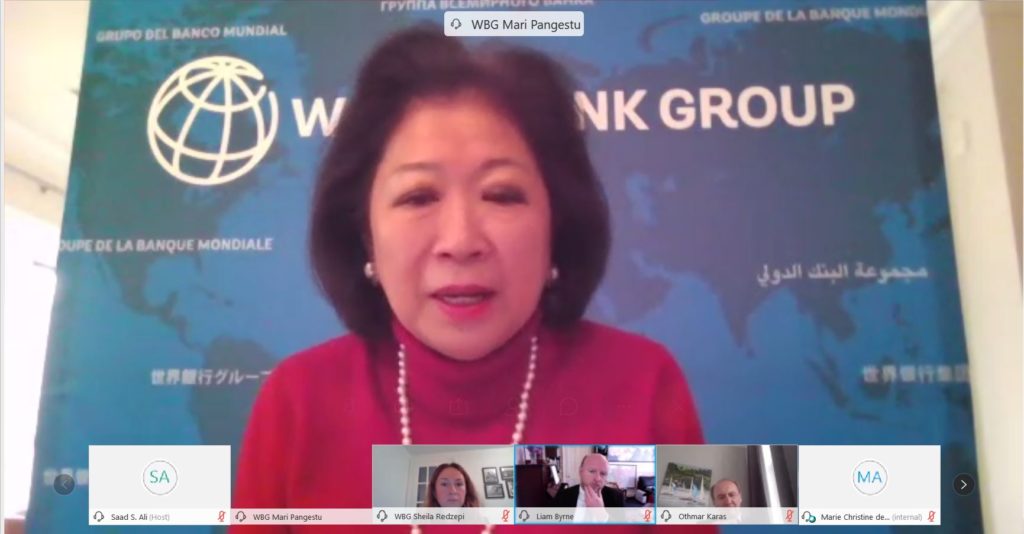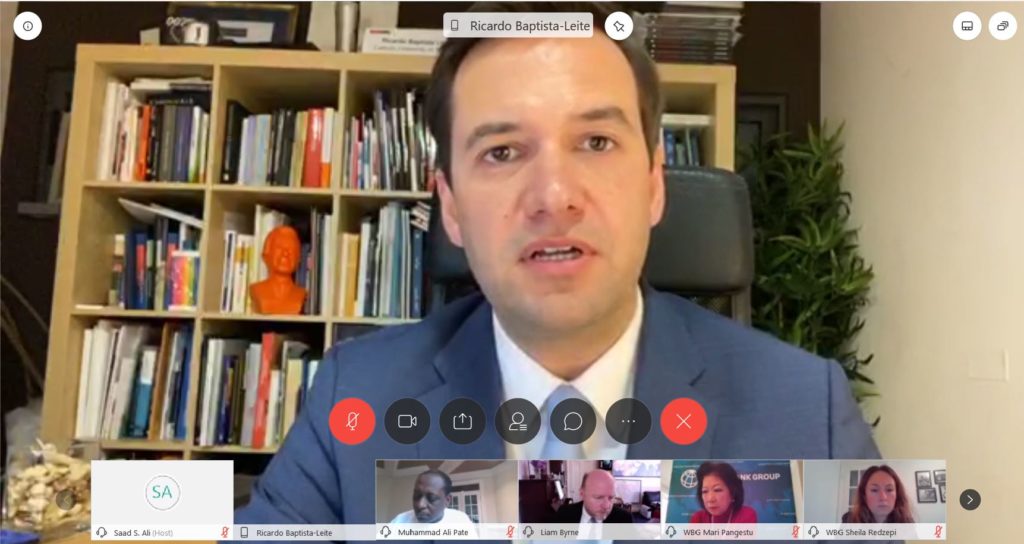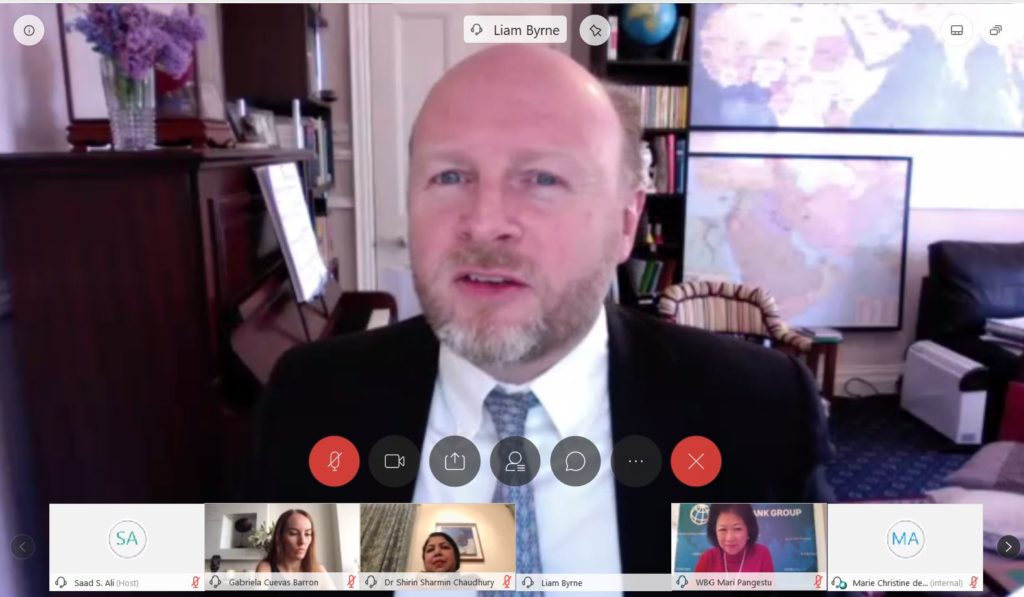On 24 April 2020, the Parliamentary Network on World Bank & IMF (PN) organized jointly with the World Bank Group (WBG) a Virtual Parliamentary Meeting on Pandemics with a Special Focus on Covid-19 gathering around 255 participants from over 70 countries including 124 Parliamentarians from 55 different countries. The purpose of this meeting was to discuss the social and economic impacts of pandemics and what additional actions can parliamentarians take to cope with crisis.
The Rt Hon. Liam Byrne MP, Chair of the Parliamentary Network, welcomed the participants by stressing the importance of parliamentarians working together to solve global problems. In this era of shockwaves, he said members of parliament must unite to make sure that no one is left behind. Sheila Redzepi, Vice-President of External Corporate Relations of the WBG, welcomed the participants on behalf of the World Bank and spoke about the importance of sharing strategies and best practices as critical means to fight this pandemic, as well as the unprecedented economic and health crisis the world is facing today.
Mari Pangestu, Managing Director of Development Policy and Partnerships of the WBG, stated that parliamentarians are key partners of the World Bank as they have the same objective, namely to serve the people they represent and those most in need. Ms Pangestu emphasized the importance of assessing priorities when undertaking national and global actions. Partnership, she said, is key since parlimentarians are able to identify the local needs within their countries and constituencies and can vote measures, draft stimulus packages and hold virtual sessions to address this emergency. She continued by explaining that the WBG has been taking fast actions by identifying the needs of the most vulnerable countries and those at risk of fragility and conflict. These actions include creating health emergency programs, working with the G20, provide countries with fresh net cash inflows and pushing for a global debt moratorium to provide fiscal space to states to act amidst this crisis.

Mari Pangestu, Managing Director of Development Policy and Partnerships of the WBG
Mohammed Pate, Global Director for Health, Nutrition and Population of the WBG explained that the WBG has put in place huge and fast measures by mobilizing new resources and reallocating the existent ones. These actions have helped countries build medical systems and core capacities in preparedness. The World Bank also provided protective equipment and facilitated their provision to countries most disadvantaged. Dr. Pate mentioned that beyond this pandemic there are other diseases equally lethal and the World Bank is working to ensure the services of health continue to be delivered. He closed his statement by stressing the importance of global partnership between multilateral organizations, members of parliament, governments and civil society and exhorted parliamentarians to work to strengthen health preparedness and build response plans.
Ricardo Baptista Leite MP, Vice Chair of the Parliamentary Network and President of UNITE, spoke about the role of parliamentarians in the management of the crisis throughout the short, medium and long term given their role to change laws, approve specific budgets, design plans of deconfinement, and keep governments accountable. Parliamentarians, he said, need to work closely with their constituents when undertaking political action and civil society work, and by using media to pass clear messages based on reliable information. He emphasized the risk of leaving behind people affected by other diseases and recommended setting up national cashflows to protect enterprises. He stressed the importance of concrete action plans on how to end lockdowns and being prepared to reinstate measures if needed.

Ricardo Baptista Leite, Vice-Chair of the PN President of Unite
During the discussion, parliamentarians had the opportunity to share their insights and experiences regarding the management of the pandemic. They presented some of the measures adopted by their respective parliaments to cope with COVID-19, such as implementing and extending lockdown and travel restrictions, voting economic and fiscal packages, providing their governments with extraordinary powers and monitoring their response. Betty McCollum MP, Congresswoman of the United States spoke about the imperative of having public policies based on scientific facts. Giulio Centemero MP, Co-Chair of the Parliamentary Assembly of the Mediterranean Panel on Trade and Investments, stressed the importance of transparency and the exchange of information as one of the key responses to the pandemic.
Additionally, speakers discussed the importance of protecting the most vulnerable and considering socioeconomic inequalities in the implementation of public policies. Shamsul Iskandar Mohd Akin MP, Board Member of the PN, emphasized the need of taking into account the socioeconomic inequalities by focusing on the most vulnerable while designing the measures to mitigate the negative consequences of the pandemic. Shirin Sharmin Chaudhury MP, Speaker of Parliament of Bangladesh, presented the protection of the poor and vulnerable as the most immediate challenge, and spoke about the different stimulus packages that have been put in place in Bangladesh to achieve this.
The speakers also stressed the importance of having a strong parliamentary oversight. Senator Neila Tazi highlighted the need of maintaining an inclusive economic parliamentary oversight both in the private and public spheres and Yunus Carrim MP, exposed the risks of the executive side-lining parliaments. Kandeh Yumkella MP stated that resilience can only be built through the correct functioning of democratic institutions such as Parliaments. Furthermore, members of the panel agreed that parliaments must keep working in order to ensure democracy and protect human rights. Gabriela Cuevas MP, President of the Inter-Parliamentary Union, spoke about the need of having parliaments producing legislation, adapting budgets and working closely to governments. Claudio Borghi MP, expressed his concerns regarding the limitation of individual freedoms and the alienation of parliaments from the decision-making processes.
In regard to multilateralism, all legislators agreed on the subject of strengthening international cooperation to address this global crisis. Othmar Karas MEP, Vice-President of the European Parliament, and Vjosa Osmani-Sadriu MP, Speaker of Parliament of Kosovo and Board Member of the PN, concurred on the interconnectedness of healthcare, economic, social and human rights issues, and stressed the importance of increasing multilateral cooperation to address these global challenges and to coordinate internationally at all levels. Aina Kuric MP stated: “This crisis is global and necessitates a coordinated response. The time has come for us to forget old ways and shift toward a new era of international cooperation”, while Senator Hodan Osman, Treasurer of the PN, highlighted the role of International Financial Institutions in mitigating the economic impact of the pandemic.

The Rt Hon. Liam Byrne MP, Chair of the Parliamentary on the World Bank & IMF
In his closing remarks, The Rt Hon. Liam Byrne MP announced the development of a digital platform by the PN to share parliamentary perspectives on COVID-19. He spoke about the need of sharing thoughts on poverty and labour market responses and to rethink the Sustainable Development Goals in the post pandemic world. The Chair of the PN made a call to strengthen multilateralism, to continue to support social actions, and to rethink the current healthcare and economic models in order to build global resilience.
“This is not an era of change, but a change of era.”
– The Rt Hon. Liam Byrne MP, Chair of the Parliamentary Network on the World Bank & IMF
Key policy recommendations
- Ensure substantial investment for health infrastructure and promote universal medical coverage
- Make sure funding from international financial institutions is used in a transparent manner overseen by Parliament
- Develop legal frameworks for pandemic preparedness for the management of future health crises
- Set up specific relief funds and programmes dedicated to the fight against the economic and social consequences of epidemics or pandemics
- Strengthen collaboration between national parties within parliaments through all-party groups as a means to create national solidary to cope with the crisis and reinforce multilateral cooperation
You can download a summary of the event here and see more photos from this event on our Flickr page here.
